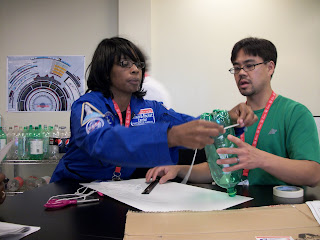Two weeks ago all of the teachers and staff of Holderness Central School sat in the school library and said goodbye to Evie Spodnik.
Sadly, like so many other positions across the state, our reading specialist position had been cut, and we were losing Evie. I sat across from her, so close I could reach out and touch her hand. So close I could see the specks of dark gray in her eyes. I looked into those eyes while our principal spoke eloquently about the job she had enthusiastically and happily done over the past few years at Holderness, before opening the floor to anybody else who would like to speak. Teacher after teacher began to talk to and about Evie—and we heard how efficient and effective she was as a reading teacher. We heard how kind she was. We listened to success stories about struggling readers who became proficient and confident. Tales were told about families she connected with and students who left the classroom for her care and help with beaming smiles on their faces—they relished their time with Ms. Spodnik. It was an outpouring of support, collegiality, and such positivity and appreciation that does not occur enough in our regular days. When I got home that night, I called a friend I teach with, and told her how touched I was by the luncheon. How wonderful it was to hear our colleagues laud Evie’s magnificence and celebrate her on such a sad day, when we had to say goodbye.
I didn’t work closely with Evie, since we spent our days in two separate wings of the building with two different student populations, but we bumped into one another frequently in the teachers’ room, where she would regale me with adventures of living in Tulum, Mexico and other places abroad. She always had an interesting story to tell about interesting people she had once met. We would stand next to one another by the photocopier and she would look over my materials and inquire about my practices and we would discuss reading philosophies. Once in a while, I would bump into her while eating and we would exchange recipes and food ideas. I never once remember her complaining or frowning—she always had a smile on her face and a kind word to offer, even when she was obviously crunched for time. I departed our conversations wishing I had more time to see her, more time to work closely with her, because I sensed we shared similar beliefs and values.
And then this terrible news arises about her murder on a beautiful July day and shocks our community. Wondering and worried about the children she worked closely with, the families she supported, and the primary grade teachers she collaborated with, I keep bringing myself back to two weeks ago when I sat with her at lunch.
I have a crazy theory that I don’t often share with others about wrinkles—I believe that as we get older, our wrinkles tell the stories of our lives. And they tell us if we have spent more time smiling or grimacing, laughing or pursing our lips out of stress. And as I sat across from Evie, looking into those speckled eyes, I was overcome by the laugh lines that surrounded her mouth and the creases that originated from the corners of her eyes, and as those beautiful, articulate, kind and loving words filled our school library, I recognized that this was a woman who had spent her entire life making sure happiness and joy were ruling emotions.
Two summers ago I lost one of my best friends, another much loved teacher, to a car accident. Overcome with grief, sobbing, I sat on a very similar warm, sunny summer day and wondered what she would want me to do today. And I knew: help others, be a good friend, run, and eat ice cream. So I did. And I consciously carry a piece of her with me daily. Sometimes when I am teaching, I know that I am doing it for her. And when I am out on a long run, I can feel her at my side. When I call a friend, I know that this was the kind of friend she was, and when I eat ice cream, I close my eyes and enjoy every last spoonful just as we did so many times sitting next to one another. I see her face everywhere, and it catches my breath. I still feel sadness, but then I wonder if these quick glimpses are her way of saying thank you for living the way I would want you to.
When I think of Evie’s kind, kind eyes and face that was so quick to burst into a smile, I find myself with similar thoughts. How would Evie want us to live today? This woman, who walked the beaches of Mexico …who hiked out west and traveled abroad…this woman who sat patiently with small children while they struggled with reading, making them feel like they conquered the world when they overcame those troublesome Bs and Ds in words…how would she want us to live today? We learn from life, and in the face of death, need to remember to continue to do so, and I don’t think we would learn anger, resentment, or hostility from Evie’s life.
So today we should read a good book. We should walk outside and embrace the beauty of summer. We must be sure to burst out into laughter and smile, and be willing to take on an adventure. We need to slow down, and offer patience to a child. And we will do it all in honor of Evie Spodnik.











